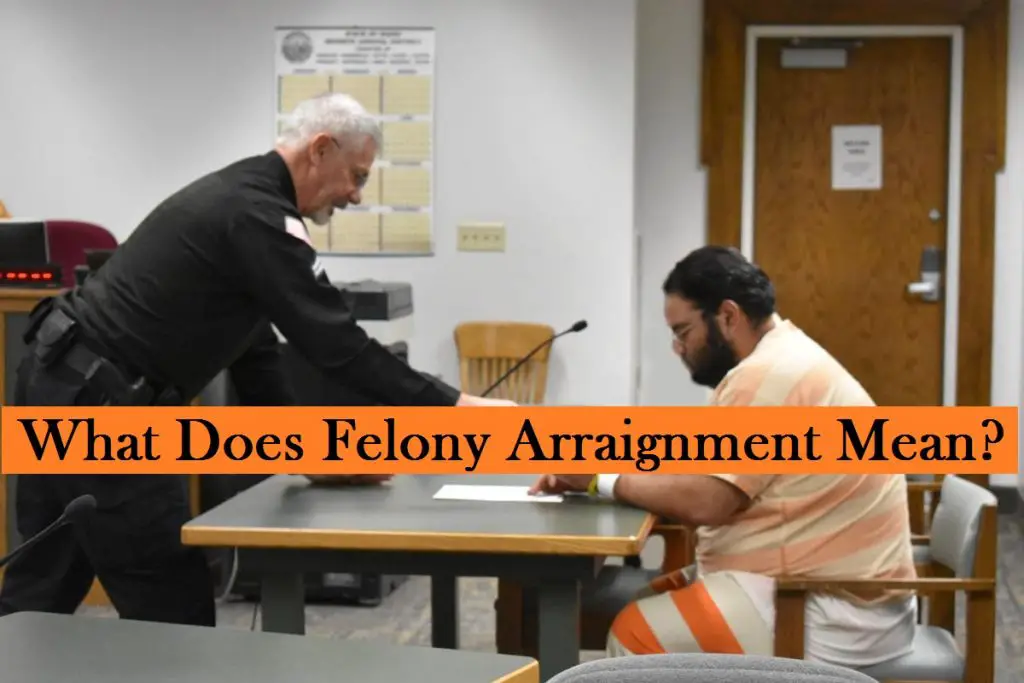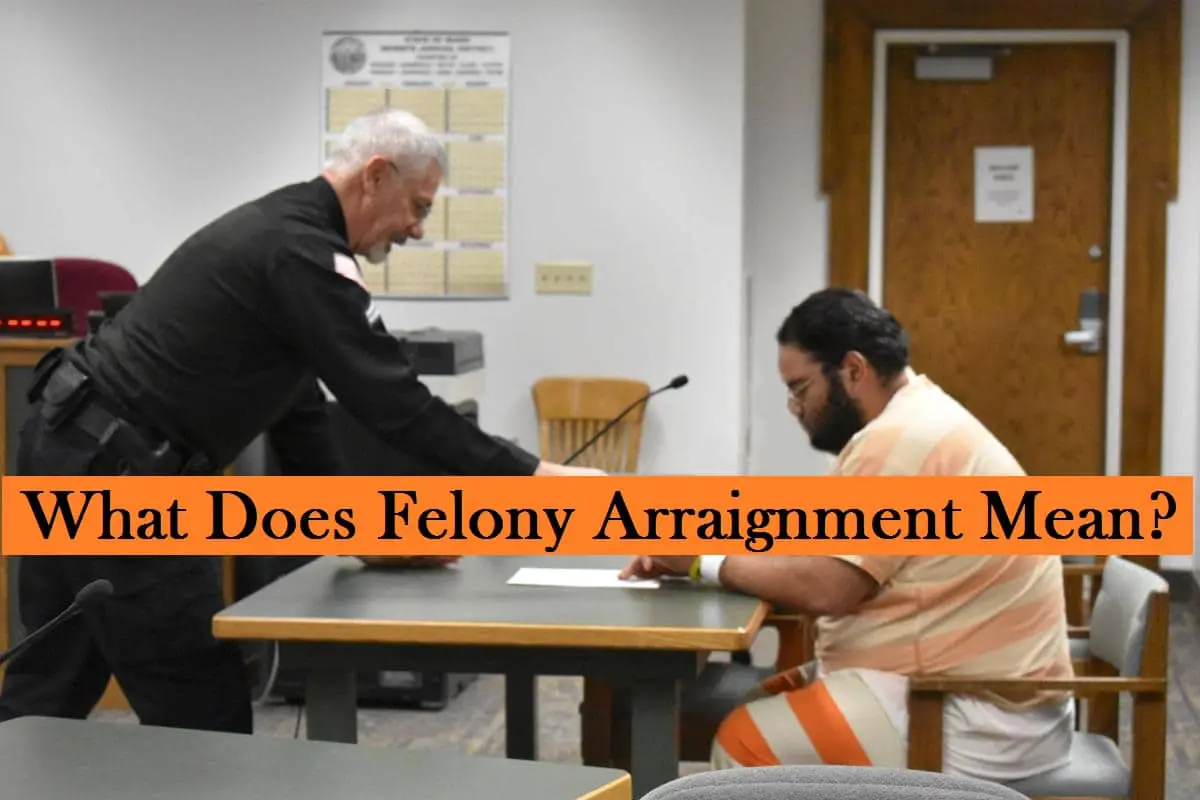Criminal offense trial can be a challenging experience. These charges, sometimes, come with some lifetime negative effects — if handled wrongly.
However, a better understanding of how the entire criminal process works gives you a positive edge to combat any negative concerns that might come up along the process. Also, consulting a well-seasoned criminal defense lawyer will help you navigate through each phase of the criminal process — seamlessly.
Let’s dig into some things you should know about how felony arraignment works; this will help you understand what to expect during the process.
What Does Felony Arraignment Mean?

Arraignment usually trails arrest and booking — typically comes 72 hours after these events. The courts, during this process, bring before an accused, their charges.
The offender, in response, can go into one among several pleas. For example, pleading guilty connotes admittance for the charges leveled against them, which, in turn, strips off their rights to a legal trial. However, pleading not guilty means denial of charges, which increases the likelihood of a trial.
What Happens During Your Arraignment Period?
Arraignment procedures vary across state laws. Here are, however, common procedures at arraignments:
- Constitutional Rights Education
In some jurisdictions, courts advise defendants of their constitutional rights — right to counsel, trial, and right against self-discrimination. Some states’ courts educate defendants of their group rights — before defendants appear before the judge.
Some state laws grant defendants right to bring in their attorneys to stand for them. Where the defendant opts for an attorney-representation, the court can only arraign the defendant after offering them an opportunity to seek legal counsel or hire a public defender to stand for them.
- Explanation of Charges to Defendant
During an arraignment, the defendants should be informed about the cases filed against them. Most states’ legislation upholds that the judge reads out the complaint, indictment, and other relevant information regarding the charges to the defendant – except where defendants request otherwise. Defendants also reserve the right to a copy of the case file.
- Entering a Plea
After the court advises the defendant about his charges, s/he’ll be asked to choose a plea option among three — guilty, not guilty, no contest.
- Not Guilty
Typically, criminal defense lawyers advise their clients to plead not guilty. When this happens, the prosecutor brings up evidence and offer them to the defense. The defense reviews and further his investigation, to determine how much the evidence link his client to the crime.
Pleading not guilty gives the prosecutor an opportunity to offer evidence that back their accusations against the defendant.
- Guilty
Pleading guilty to a crime means the defendant’s admittance to the charges against them. In this case, the judge may pronounce a sentence at arraignment — particularly when it involves monitor crimes like misconducts. For more serious cases, the judge may ask for a pre-sentence report and set a hearing for sentencing.
- No Contest
Here, defendants accept the prosecutors have proof than he committed the crime, albeit, does not admit he is guilty. The court processes this plea similar to when the defendant pleads guilty.
- Release Conditions
In some state laws, where necessary, setting condition of release comes under the arraignment process. To determine whether or not to release a defendant before completing their case, the court may review, primarily:
- Criminal records of the defendant
- If the defendant poses any threat to the community
- If the defendant works in the community — if yes, the duration
- The period the defendant has resided in the community and their family ties
- Whether records suggest the defendant’s failure to show up in court
In determining release conditions, the courts may take a decision based on the following options:
- Release on Own Recognize
Here, a defendant is released based on their promise to show up for hearings during his/her trial. Often, defendants are released for cases considered minor, or where their records show little or no criminal charges. Permanent employment and local residential address further increases their chances of a release
- Bond or Bail
When required to post bond and bail, it means defendants must deposit cash to secure their release, pending when the case is settled. This money may be paid either by surety bond or cash bond.
Where the judge requires a cash-only bond, say $15,000 cash, the defendant must post the amount with the court. The money is usually refunded after completing the case — after court fees deductions.
Where a surety bond is specified, a bail bondsman or a bondsman is allowed to pay a certain percentage of the total amount with the court. This is usually followed by an agreement that the bondsman will be liable, and pay whatever unpaid bond — in the event defendants abscond or fail to show up in court.
However, the bondsman receives a nonrefundable percentage — mostly 10% — of the total bond and offer collateral — like deeds to real estates — and/or a consignor.
Where the defendant absconds, the bondsman will pay the bond to the court He can — afterward — either retrieve the sum from the consignor or claim the collateral.
- Other cases
Besides the Release on Own Recognition or the post bail, other release conditions are available.
These may include:
- Blocking all defendant-witness contacts
- The prohibition of drug and alcohol use
- No contact with other defendants and known criminals
- No new arrests, no weapon possession
- Restriction of movement outside the state or country.
Where any of these provisions are violated, the Release on own recognition or bond bail may be annulled, and the defendant held — without bond.
- Supervised release
While a case stays pending, the judge may put defendants under a supervised release scheme. This is termed pre-trial supervision across some states — a program similar to probation while a case pends. Defendants are expected to report to a supervising officer — like the probation officer — and follow the officer’s directives.
See also: What is a Deferred Sentence?
How Do I Prepare for an Arraignment?

One effective way to successfully going through an arraignment is seeking direction from a seasoned criminal defense attorney. They know how best to build a good defense strategy an increase your chances of success. Here are other vital tips to know about your arraignment process.
- Do well to come early at your arraignment. It’s a lot better to arrive early and wait up — than show up late.
- Dress well. Be conservative in your appearance — come in a suit or a dress shirt, blended with slacks or skirt. Avoid sporting wears, jeans, clothing with attracting logos and other casuals. This may send wrong signals about your personality to the judge.
- Come in with an officer of the court. Do not approach the judge except permitted to.
- Be alert and listen when standing before the judge. Where requested, ensure your responses are precise and courteous.
- Do not narrate your case details to the judge or courthouse staffs — discuss only with your lawyer.
Discuss with an Attorney
If you got an arraignment notice or got arrested, consult a seasoned attorney as soon as possible. An experienced attorney will take you through the arraignment process — according to your state laws — and offer professional advice on the available options. When represented by a counsel, the arraignment process can be a walk in the park. And, ultimately, this will make a significant impact on the release condition the court adopts.
After an Arraignment
Arraignment is a vital — but challenging — part of a trial. Here, charges are tendered before the defendant, formally, and a plea is entered. More than ever, the defendants need support from all quarters — particular from friends and family.
Families ought to stand by their loved ones as they navigate through this dreaded legal process. Encourage the defendant to discuss and cooperate with their criminal defense attorney for the best outcome.
Have you experienced a felony arraignment? Kindly share your advice in the comment box.
Read also: Can Felons Vote in the State of Texas?

